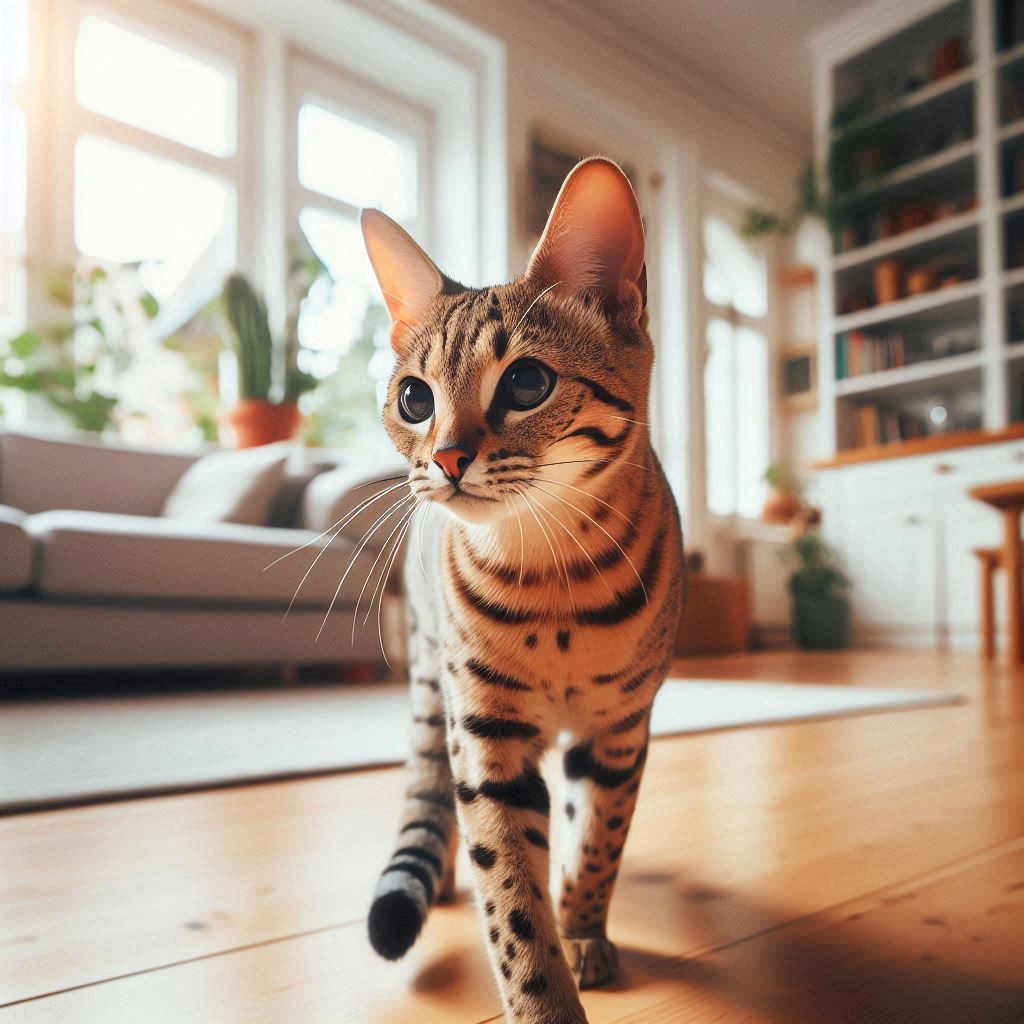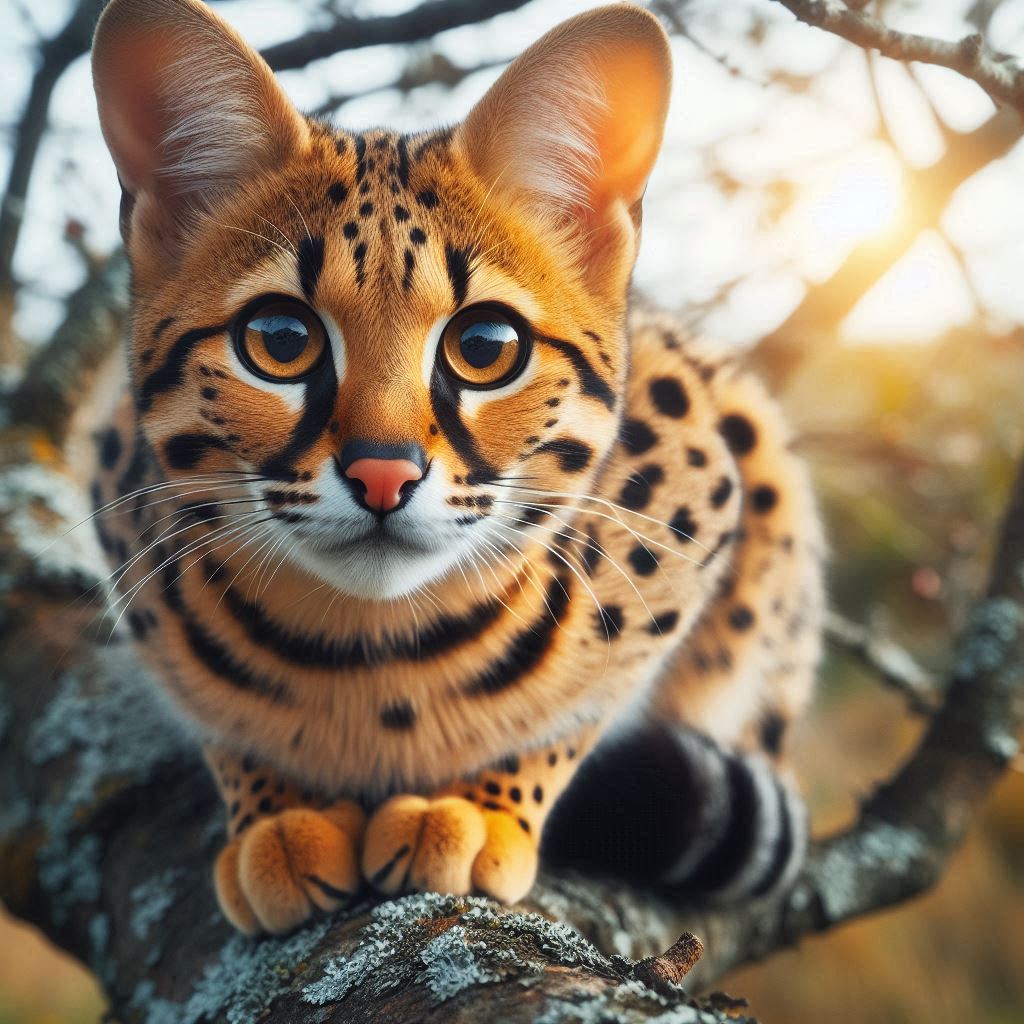The Savannah cat is a strikingly exotic breed that captivates cat enthusiasts with its wild appearance and domesticated nature. A hybrid between a domestic cat and the African serval, the Savannah cat has quickly gained popularity for its majestic looks, large size, and unique personality. With its tall, slender frame, bold markings, and energetic demeanor, the Savannah cat is a breed unlike any other, combining the beauty of the wild with the affection of a pet.
History and Origins of the Savannah Cat
The Savannah cat breed originated in the late 1980s when breeders crossed an African serval, a wild feline known for its tall legs and spotted coat, with a domestic Siamese cat. The first known Savannah kitten was born in 1986. This pairing was the foundation for what became the modern Savannah breed, officially recognized by The International Cat Association (TICA) in 2001.
Savannah cats are classified by generations, ranging from F1 to F5, based on how many generations removed they are from their wild serval ancestor. F1 cats are directly descended from a serval and a domestic cat, making them the largest and most serval-like in appearance. As the generations progress, the percentage of serval genes decreases, with F5 being the most domesticated in behavior and size.
Physical Characteristics of the Savannah Cat
The Savannah cat’s wild, exotic appearance is one of its most defining traits. Its striking resemblance to a wild feline makes it one of the most visually stunning cat breeds.
- Size: Savannah cats are larger than most domestic cats. F1 and F2 generations, which are closer to their serval ancestors, can weigh anywhere from 15 to 25 pounds and stand up to 17 inches tall at the shoulder. Later generations, such as F4 and F5, are typically smaller, weighing around 10 to 20 pounds.
- Body Structure: Savannahs have long, lean, and muscular bodies with tall legs that give them a regal and athletic appearance. Their back legs are slightly longer than their front legs, which enhances their wild look.
- Coat and Markings: Their short, sleek coat can come in a variety of colors, but the most common are golden, silver, black, or brown with distinctive dark spots, stripes, and other patterns that resemble the coat of a serval. These markings are bold and contrast sharply with their base color.
- Ears and Eyes: Savannah cats have large, rounded ears that sit high on their head, a trait inherited from their serval ancestor. Their eyes are typically large, almond-shaped, and can range from green to gold or even blue, depending on their coat color.
Personality and Temperament
Savannah cats are known for their energetic, intelligent, and playful nature. They have a high activity level, and their personality often mirrors that of a dog rather than a traditional domestic cat.
Loyal and Affectionate:
Savannah cats are extremely loyal and form strong bonds with their owners. They are known to follow their humans around the house, much like a dog, and enjoy being involved in daily activities. Despite their wild heritage, they are affectionate and love interacting with their families.
Playful and Energetic:
These cats are highly energetic and love to play. They enjoy interactive toys, puzzles, and games that challenge their intelligence. Savannahs have been known to play fetch, and they thrive on physical activities like running, jumping, and climbing.
Curious and Intelligent:
Savannah cats are incredibly intelligent and curious. They are quick learners and can be trained to perform tricks, walk on a leash, and even respond to commands. Their inquisitive nature means they enjoy exploring new environments and are always eager to investigate new objects or situations.
Social and Friendly:
Savannah cats are generally social and enjoy the company of people, other cats, and even dogs. They are not shy, and many Savannahs are outgoing and friendly with strangers.

Caring for a Savannah Cat
Despite their exotic appearance, Savannah cats are relatively low-maintenance when it comes to grooming. Their short coat is easy to care for, and their grooming needs are similar to other domestic cats.
Grooming
Savannah cats do not shed excessively, but weekly brushing helps to keep their coat looking sleek and healthy. Regular brushing also reduces the amount of loose hair and keeps their skin in good condition. Their large ears may accumulate dirt or wax more easily, so regular ear cleaning is recommended to prevent infections.
Diet and Nutrition
Look for foods where meat (like chicken, turkey, or fish) is the primary ingredient. This supports their muscle development and overall energy levels.
Exercise and Play
Engage in interactive play sessions using toys like feather wands, laser pointers, and balls. These activities mimic their hunting instincts and keep them mentally stimulated.
Health and Lifespan
Savannah cats are generally healthy, but as with any breed, they can be prone to certain health issues. Regular vet checkups and proper care are essential to ensure their well-being.
- Hypertrophic Cardiomyopathy (HCM): This is a heart condition that can affect Savannah cats, where the heart muscle thickens, potentially leading to heart failure. Regular heart screenings can help detect this condition early.
- Nutritional Needs: Savannah cats benefit from a high-protein diet to support their active lifestyle. Some owners choose to provide a raw or high-quality commercial diet, ensuring the cats receive the nutrients they need to stay healthy and fit.
With proper care, Savannah cats typically live 12 to 20 years, depending on their generation and overall health.
Savannah Cats and Their Living Environment
Savannah cats are best suited for homes where they have plenty of space to run, jump, and explore. They enjoy climbing to high places, so providing cat trees or shelves is a good way to keep them entertained.
Because of their wild ancestry, some Savannah cats, particularly the earlier generations (F1 and F2), may require more time to adjust to new environments and training. They do best in homes with experienced cat owners who understand their need for stimulation and exercise.
Why Choose a Savannah Cat?
Savannah cats are perfect for those who want an exotic-looking pet with a friendly, loyal, and playful personality. They are a good choice for individuals or families who are active, have space for the cat to roam, and enjoy interactive play.
Their dog-like loyalty, combined with their striking appearance, makes them a captivating and unique companion.
Conclusion
The Savannah cat is a remarkable breed that brings together the wild beauty of the African serval and the loving nature of a domesticated pet. With their stunning appearance, high energy, and affectionate personality, they make incredible companions for those who are willing to meet their needs. Though they require space and stimulation, Savannah cats reward their owners with loyal companionship and endless entertainment.



